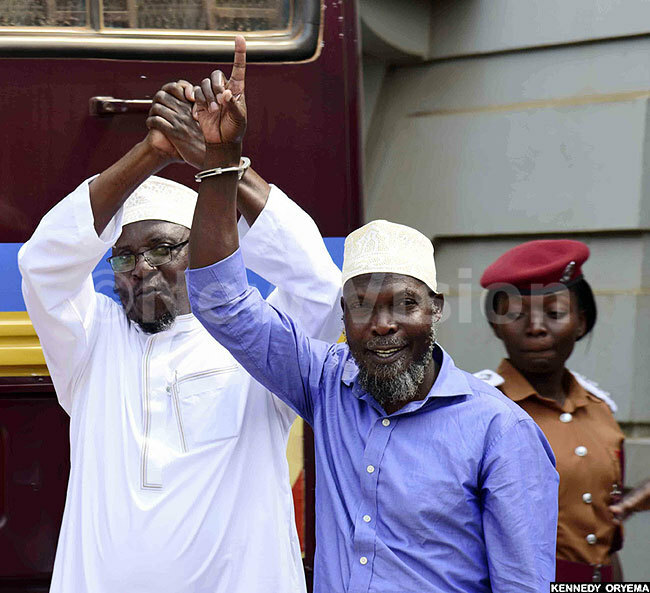Muslim cleric murders: Court delivers verdict today
Aug 21, 2017
The suspects, who include the Tabliq leader Amir Ummah Sheikh Muhammad Yunus Kamoga, have been on trial since June 2016.

PIC: Terrorism suspects Muhammad Yunus Kamoga (left), Abdulsalam Sekayanja and Siraje Kawooya attend a court session in July this year. (Credit: Kennedy Oryema)
CRIME | COURT
KAMPALA - The long-awaited judgment of 14 men battling charges of terrorism and complicity in the murder of prominent Muslim clerics in the country is expected to be delivered Monday at the International Crimes Division of the High Court in Kampala.
The suspects include the Tabliq leader Amir Ummah Sheikh Muhammad Yunus Kamoga.
They have been on trial since June 2016 before a panel of three High Court judges headed by Ezekiel Muhanguzi. The others are Jane Kiggundu and Percy Night Tuhaise.
The majority of the accused men were arrested in January 2015 and indicted for murder of a number of prominent sheikhs including Mustafa Bahiga and Hassan Kirya.
Bahiga was shot dead by unknown assailants riding on boda boda on December, 24, 2014 at Bwebajja along Entebbe road while Kirya was gunned down on June 30, 2016 in the city suburbs of Bweyogerere in similar fashion.
The other accused men are Sheikh Siraje Kawooya, Murta Mudde Bukenya, Fahad Kalungi, Amir Kinene, Hakim Kinene Muswaswa, Yusuf Kakande, Abdulsalam Sekayanja, Abdulhamid Mubiru Sematimba, Hamza Kasirye, Twaha Ssekitto, Rashid Jjingo, Musa Issa Mubiru, and George William Iga.
By midday Monday, the group and their relatives are expected to have known their fate.

The Director of Public Prosecutions (DPP) produced 36 witnesses, upon which court found all the accused with a case to answer.
The DPP lawyers were led by principal state attorney Lino Anguzu. Others are Thomas Jatiko and Rachael Bikhole.
The 14 accused that are represented by MacDosman Kabega, Fred Muwema, Roberts Kagoro, Twaha Mayanja, Charles Nsubuga and Sylvia Namawejje opted to remain silent.
Giving their opinion recently, assessors Robert Sseguya Lubega, Ahmed Ddumba and Judith Muhairwe advised the judges to acquit the 14 accused men on grounds that there was no incriminating evidence at all against any of the accused persons to show that any of them before court participated in the actual murder.
Most of the prosecution witnesses told court that there was a fight over leadership between the deceased persons and Sheikh Kamoga and his group, which could have resulted into the murders.
Sheikh Yasin Kakomo, one of the prosecution witnesses, told court that the deceased were accusing Kamoga of mismanaging the Tabliq Muslim community (Jamiyyat Daawa Asalafiyyah) affairs and they hence denounced him.
However, shortly after they denounced him, flyers with portraits of the deceased persons and some of their allies started circulating in various mosques and seminars warning Muslims not to associate with them because they were wrong elements and enemies of the Islamic religion.
